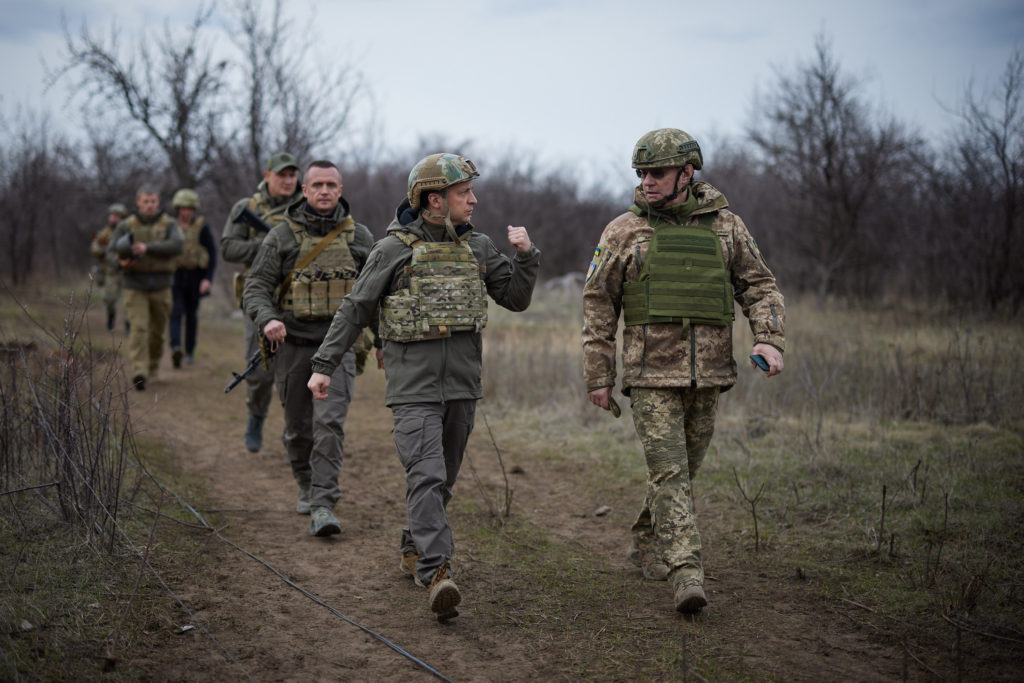KYIV
Prospects for progress in the conflict between Ukraine and Russia are growing grimmer, as the Kremlin is flatly ruling out talks with Kyiv.
Kremlin spokesman Dmitry Peskov firmly rejected any presidential-level discussions regarding separatists in the Donbass region of Ukraine.
“President Putin was absolutely clear in his stand on this initiative,” Peskov said. “A dialogue can deal strictly with issues of bilateral relations. There can be no dialogue on the basis of trying to find a settlement to the conflict in southeastern Ukraine.”
The separatists, who have set up unrecognized statelets in the industrial Donbass area known as the “Donetsk People’s Republic” (DNR) and the “Lugansk People’s Republic” (LNR), both with ill-defined would-be borders, are backed and bankrolled by the Kremlin.
But Moscow says the conflict is purely an internal Ukrainian one, and insisted that Kyiv talk with its proxies in the Donbass region. Kyiv says this is largely senseless as the nominal leaders in the region are little more than Kremlin figureheads.
The conflict broke out in 2014 after Russia annexed Crimea, amid seething by Moscow that pro-Russian president Victor Yanukovich was toppled after street fighting in Kyiv left more than 100 dead and many more injured. Moscow says Yanukovych’s overthrow was a CIA and Western plot.
REJECTION OF KYIV’S OLIVE BRANCH
The snub was an eye-popping dismissal of hopeful talk by Ukrainian President Volodymyr Zelensky, who was elected to power promising a rapprochement with Moscow, only to come up empty-handed.
On Monday, he said he had asked his chief of staff to sort out arrangements for a possible meeting with President Putin.
“Everything is moving towards this meeting taking place,” Zelensky said during a gathering devoted to the 35th anniversary of the Chernobyl nuclear disaster in Soviet Ukraine. “I have issued instructions to those in charge of the president’s office to contact President Putin’s administration in order to reach an agreement, to find a place, a city where we could meet.”
Zelensky has doggedly persisted in trying to advance at least some sort of peace initiative to solve what amounts to a particularly deadly version of the “frozen conflicts” involving Russia in a number of ex-Soviet states.
But the Kremlin’s outright rejection of his overtures were a clear sign that Moscow believes it has the upper hand against the comedian-turned-leader.
ZELENSKY TRIES TO GET MORE WESTERN SUPPORT
Zelensky’s latest initiative was to broaden the international talks to bring in bigger world players.
“And not just because they are powerful, but because they have expressed a desire to help Ukraine in stopping the war. I think this would be the right thing to do.”
And he suggested giving a new impulse to the periodic talks in Minsk, Belarus.
“I believe that we must be flexible with [the Minsk process],” Zelensky said. “No one is saying that we should close down Minsk. But I believe that some of its points must be updated.”
“This could be an expansion of the Normandy format, a separate, parallel format with other countries, with very serious powerful players,” he said during a visit to southern Ukraine.
On Tuesday, Zelensky came up with new proposals to use those existing forums. The “Normandy Format” includes France, Germany and Russia and “three-cornered” talks in the Belarusian capital. The latter have produced two largely unfulfilled agreements.
And nothing even remotely like a breakthrough. Monitors from the Organisation for Security and Cooperation in Europe (OSCE) are in the area, but have been scoffed at by many locals as largely irrelevant. The well-dressed and equipped monitors, they say, disappear before nightfall, when armed action has generally taken place.
Ukraine has marshalled support across Europe and North America to press for a new round of talks with the participation of Western countries, but Russia has paid scant heed, and it skipped an OSCE meeting earlier this month.
RUSSIAN PULLBACK OR SLEIGHT OF HAND?
Late last week Moscow began pulling back some of the 100,000 to 150,000 troops that Western intelligence says the Kremlin brought to Ukraine’s borders in what was widely seen as saber-rattling.
It said the deployment had merely been an “exercise”.
But no sooner than the troops were announced to be headed back to bases, which are often not far from the Ukrainian frontier anyway, Moscow began to impede the movement of Ukrainian vessels in the critical sea of Azov, a lifeline for Ukrainian exports from key ports like Mariupol.
Moscow has taken such actions since 2014 sporadically, but this time it appears to be asserting a more systematic approach.
Russia says the measures, which would effectively last six months – until October – technically involve only a restriction on Ukrainian naval vessels. But this is a legalistic formality, as any ship could be effectively subject to inspection.
“This would be the latest example of its ongoing campaign to undermine and destabilise Ukraine,” Pentagon spokesman John Kirby told reporters last week.
The Russian act contravenes a 2003 Russian-Ukrainian agreement on the use of the Sea of Azov, effectively a bay leading to the larger Black Sea. Under that bilateral document, both countries have joint use of the waterway.
ECONOMIC IMPORTANCE
The Sea of Azov, which is accessible only through the strait of Kerch near Crimea, has enormous economic importance for Ukraine.
Ukraine’s major seaport in Mariupol – and Berdansk – are critical to its economy. By inhibiting movement, the two industrial ports can be at best limited in their export capacity and at worst be rendered useless.
Mariupol, near the official frontier between Russia and Ukraine, has been a constant object of speculation and was briefly occupied by separatist forces in 2014.
The city is home to enormous factories churning out finished metals. If faced with a force majeure due to an inability to export, those facilities could become idle. Because of the massive amount of energy needed to re-start such factories and their blast furnaces, they could be rendered derelict, thus dealing another blow to Ukraine’s already weak economy.

